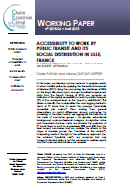
The economic analysis of the forest transition: a review
par Edward B. Barbier, Philippe Delacote, Julien Wolfersberger
The forest transition describes a reversal or turnaround in long-run land-use trends for a country or region from a period of net forest area loss to net gain. Such forest recovery has occurred in high-income economies, and increasingly in developing countries. Although this process has been studied extensively by geographers, social scientists and historians, only recently has it been analyzed by economists. This contribution has focused on how competing land use values result in changing patterns of use that lead to an increase or decrease in forest cover. A simple model of forest transition is developed to illustrate this approach in the literature. Empirical applications attempt to explain the underlying economic factors, including governance and institutions, which determine the long-run transition in land use values and patterns. The various findings of these analyses have important policy implications, including for REDD+ and other forest recovery programs.
KEYWORDS . Deforestation . Forest Transition. Forest Policy . Land Use Change. REDD+
